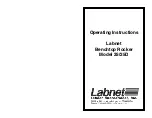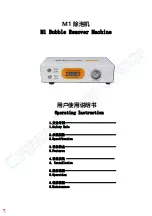
2 / 4
P/N 10-5211-501-AZ70-12 • ISS 29JUN16
Operational settings
Figure 3: A70E-2 Conventional Zone Interface wiring
Setting the address
The A70E-2 Conventional Zone Interface contains a 7-way DIP
switch, which is used to set the device address in binary code.
The switch may be set to represent all addresses from 1 to
127. See Figure 3 for the location of the address DIP switch.
The address is the sum of the switch values, as shown in the
following table. Note that the switch values determine the
address, not the switch numbers.
Switch
number
1
2
3
4
5
6
7
Code value
1
2
4
8
16
32
64
Power supply selection – J1
Jumper J1 is used to select between an externally powered or
loop powered conventional zone. For the location of J1, see
Figure 3.
Note:
Remove both jumpers before inserting either of them.
External 24 VDC power
Note:
The device will go into fault if the jumpers are left out or
if external power is removed when J1 is in the External 24 VDC
Power position.
Loop power
Operating mode selection
A 2-way mode DIP switch is used to select the conventional
zone operating mode. See Figure 3 for the location of the
mode DIP switch.
Table 1: Operating mode selection
Switch selection
Mode
SW 1 and 2 OFF
Normal mode, see Figure 4
SW 1 ON and 2 OFF
Intrinsically safe mode, see Figure 7
SW 1 and 2 ON
Intrinsically safe mode, see Figure 7
SW 1 OFF and 2 ON
Head-out mode, see Figure 5 and Figure 6
Note:
It is not possible to be in both intrinsically safe and head-out
mode.
Table 2: LED indicator
LED indicator
Status
Description
Red alarm LED [1]
Flashing
Conventional zone fire
and/or switched output
operated
Yellow fault LED [1]
Flashing
Conventional zone fault
Yellow fault LED
Double flashing
Power fault
[1] Once registered by the panel, the alarm LED output is maintained
by the panel until reset.
[2] The fault LED is nonlatching.
Application notes
Figure 4: Normal mode operation
Figure 5: Head-out detection mode for Z6x0-3 detectors






















